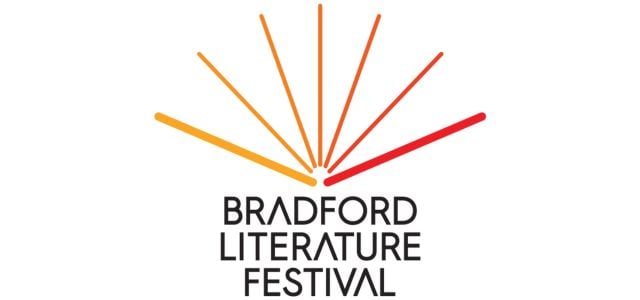Review of the first weekend at BLF 2024
Written by Madeleine Muir, local reporter for HowDo?! Yorkshire
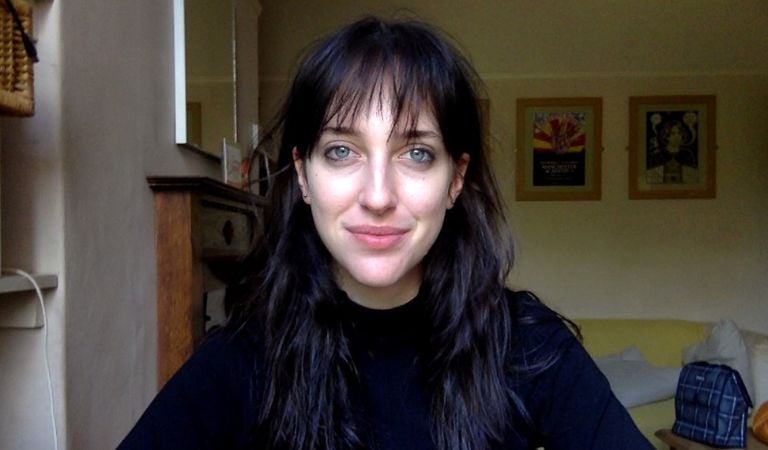
Recognised as Europe’s most diverse and eclectic literature festival, Bradford Literature Festival (BLF) is taking over the city until 7 July 2024, welcoming a wealth of panel discussions, workshops, talks, and more for those seeking a deep dive into education, literature, and culture.
This year’s festival is particularly special as it marks the 10th anniversary of BLF, kickstarting what promises to be a bountiful year in 2025 when Bradford will be the UK’s City of Culture. BLF boasts over 500 events and I went along to the first weekend of the 10-day festival to get a feel of BLF.
I arrived on Saturday, stepping into Bradford on a rainy morning after a short 20-minute train ride from Leeds. Despite the weather, the atmosphere was welcoming, thanks to the warm staff and volunteers happily on hand throughout the day. The sheltered tents in the City Park served as the Festival Hub, providing the box office and an area to relax in, complete with a kids’ craft area, a Waterstones pop-up, and small photographic exhibitions. Saturday afternoon and Sunday brought sunshine and saw children playing in Bradford’s City Park Mirror Pool and Fountain surrounded by family-friendly activities.
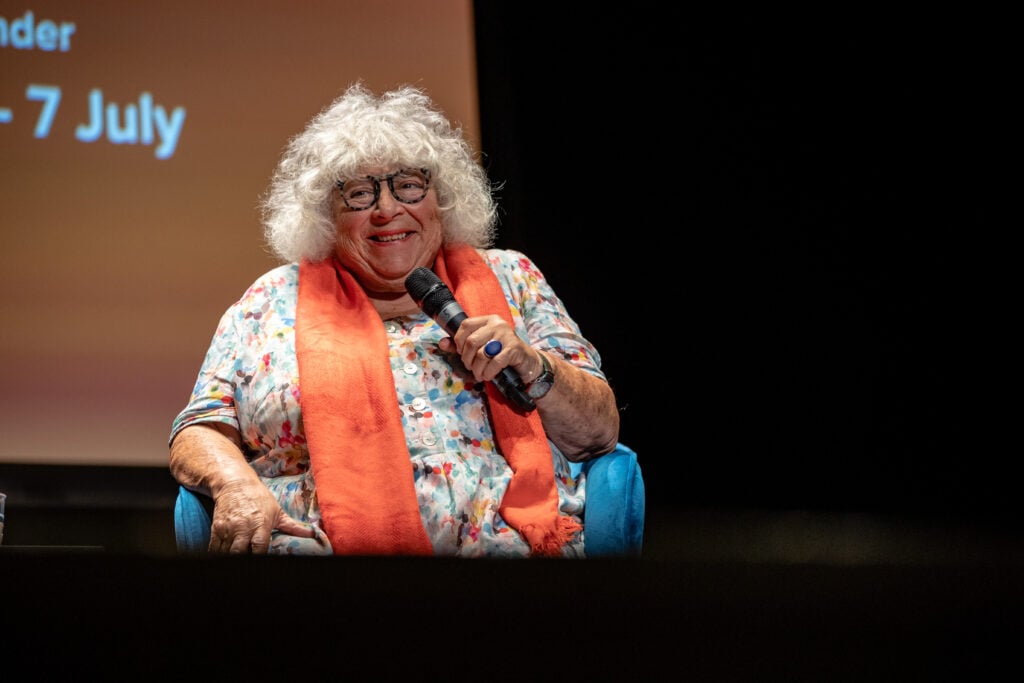
The End of Liberal Democracy
The first event I attended, held in The Studio, a 5-minute walk from City Park, was The End of Liberal Democracy, featuring author and political scientist, Anne Norton, journalist, Dr Myriam François, and writer, Salman Sayyid, chaired by Saeed Khan. This session was an excellent start for me as it reflected the festival as a whole regarding its diversity of speakers and engaging discussion of current affairs alongside their connecting histories. The speakers explored critical questions about the existence and future of liberal democracy, with Norton suggesting that its end could lead to either a more authoritarian state or a true democracy. Dr. François noted that the words, “liberal” and “democracy” often fall short of their true meanings.
With the UK general elections approaching, this discussion felt especially relevant. Salman emphasised that believing change happens solely at the ballot box is either naive or overly optimistic, asserting that there must be a “wrestling of power back.”
Norton shone a hopeful light on students protesting in camps across UK and US Universities for the liberation of Palestine, emphasising the common humanity found therein. She heralded the students for declaring that, “We have no leaders. You do not speak to our representatives; you speak to us.”
As with all of the events I attended this weekend, it ended with questions from the audience. When asked how to deal with an anxious sense of hopelessness, especially regarding Palestinian liberation, Dr François advocated for direct action and confrontational tactics, urging people to take to the streets as well as participate in small, cumulative actions that nudge our future in the right direction.
Despite the heavy and dense topics, the language used was accessible and at times, humorous, and the discussion left me with a hopeful call to action.
Artists Making Books: Poetry to Politics
In my second event, also held in The Studio, I was captivated by Dr. Atef Alshaer, who spoke about the rich art emerging from Palestine. He discussed the ongoing attempts to suppress the poetic voice of Gaza and how Palestinians continuously resist through creative means, such as poetry written on tents in the refugee camps and the use of social media to share poetry. For example, Refaat Alareer’s If I Must Die, was written and shared to social media two days before the author’s martyrdom in an airstrike by the Israeli military.
This conversation sprang from a discussion between Alshaer and Dr. Venetia Porter about the relationship between artists and writers explored in the Artists Making Books: Poetry to Politics exhibition curated by Dr. Porter and its accompanying publication. Enthralled by the snippets of poetry discussed, I bought Out Of Gaza, New Palestinian Poetry edited and introduced by Dr Alshaer. I had the privilege of meeting him after the talk where he signed my copy.
After each event I attended over the weekend, there was the opportunity to meet the speakers and purchase books to get signed by writers.
Paul Rogers: The Insecurity Trap
Next in The Studio, I attended Paul Rogers’ talk on his latest book, A Crowded, Glowering World: Paths to a Sustainable and Secure Future. Rogers discussed the necessary transformations in environmental policies, the global economy, and security strategies. His up-to-date statistics and insights sparked lively discussions among attendees.
He takes a wide look at the transformations that need to take place in light of the current ‘polycrisis’. His three areas of focus are the environmental limits to growth, the divisive global economy, and the dominant, hard-line security strategies.
I was impressed with up-to-date statistics, referencing surveys by Rethinking Security published just last week, which sparked discussion in the lobby between attendees, about what different generations have deemed to be the biggest threats to global security. This discussion proved Rogers’ talk to be enlivening and shows the openness to discussion displayed by visitors of BLF.
The Art of The Enlightenment: Islamic Contributions to Global Culture
My final event on Saturday was a panel discussion on The Art of The Enlightenment: Islamic Contributions to Global Culture. With speakers, Dr Silke Ackermann, Director of the History of Science Museum at the University of Oxford, and Dr Abdulrahman Azzam and Muhannad Shono, two of the curators of the upcoming Islamic Arts Biennale in Jeddah, which sets out to explore the diverse extents to what it means to be Muslim today, using Islamic art and culture from around the world. Shono, a prominent Saudi artist, stressed that the exhibition is a conversation between historic and current Islamic art.
Before concluding my first day, I visited Ian Beesley’s exhibition, Bradford Through the Lens, at the BLF Festival Hub. It was a special feeling to stand in the heart of Bradford while appreciating his stunning images of the city’s modern history.
Blake’s Role In Modern Mental Health
Sunday morning I headed to the University of Bradford, about a fifteen-minute walk from The Festival Hub. I spent all of Sunday there, starting with a discussion on Blake’s Role in Modern Mental Health. In this talk, Jason Wright, psychotherapist and author of Blake’s Job: Adventures in Becoming, and Stephen Pritchard from the Blake Society discussed Blake’s 22 intricate etchings of Job and their poetic power in aiding those struggling with addiction, serving as a metaphor for the healing journey.
This talk was very dense, and I wished it was longer to explore the relationship between poetry and healing more thoroughly. To make up for the seemingly whistle-stop tour of a subject that deserved more time, I had a stimulating discussion with a fellow attendee and Blake enthusiast after the event about poetry.
James Baldwins, I Am Not Your Negro
Working from the unfinished text of James Baldwin’s novel, director Raoul Peck created this exploration of the lives and deaths of three of Baldwin’s friends and comrades, Malcolm X, Martin Luther King, and Medgar Evers. I believe that this is an important and well-made film and I am grateful to BLF for access to it. However, I did find it to be somewhat of a watering down of the revolutionary ideas of Baldwin, especially as the film almost completely erases Baldwin’s homosexuality.
Art and Class: How the Middle-Class Hijacked the Nation’s Arts Galleries
After grabbing lunch from one of Bradford’s independent cafes, I headed to my final event of the weekend, Art and Class: How the Middle-Class Hijacked the Nation’s Arts Galleries with author David Kennedy. Kennedy put forward the provocative story of how working-class engagement with UK art galleries has been in decline since the Victorian era. I found Kennedy to be a refreshingly honest and humorous speaker.
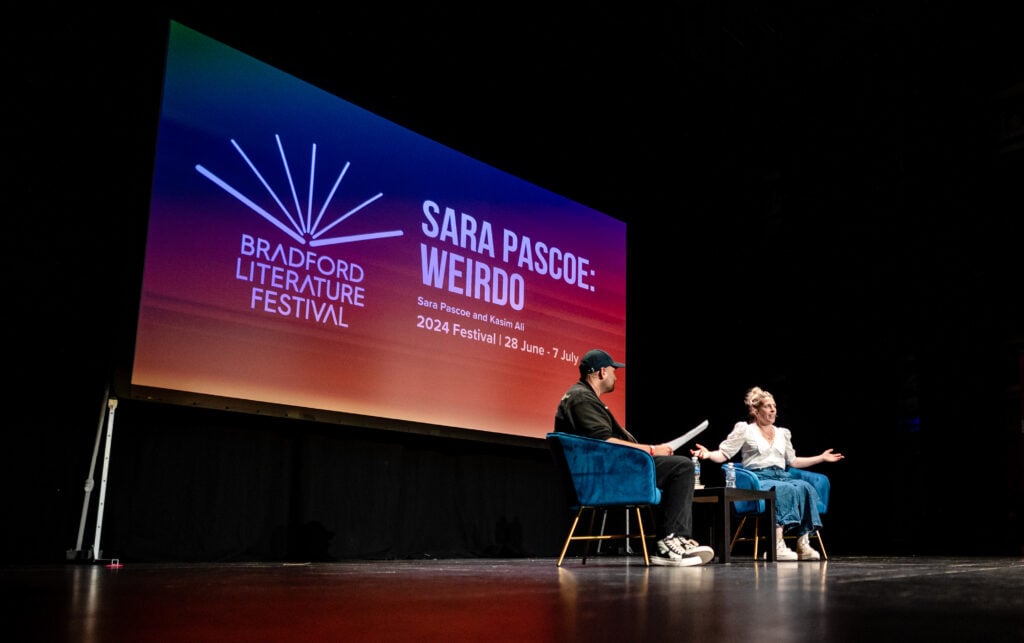
Leaving the Festival
I feel inspired and eager to conduct further research to deepen my pre-existing and new interests sparked by BLF. I look forward to getting my teeth into more Palestinian poetry, exploring the Blake Society, keeping up to date with the forthcoming Islamic Arts Biennale, and much more.
I noticed some common themes over the weekend, such as the festival’s blend of history and modernity, and its call to action on the problems we face today. I also witnessed audience members who were seeking advice from speakers as to how to cope with the existential challenges of our time with some speakers responding that one should find solace within, and others with a call to action!
You can be sure to find something for everybody with talks throughout the week on a multitude of cultural topics. Like in previous years, BLF presents new perspectives on specific subjects, including The Brontës and David Hockney for which you can find permanent exhibitions in the city along with BLF events.
This year especially, there are many events taking place in light of the struggle towards Palestinian liberation, with events over the coming week including a conversation on Jerusalem Through the Ages on Saturday and Palestine in Words on Sunday, offering readings of letters, poetry, speeches, and historical texts. There are also kids’ workshops throughout the week that appropriately touch on political issues, such as Dreaming of Tomorrow on Sunday.
A few other notable events that are looking to be popular are Bill Broady’s book launch on The Origins of the Independent Labour Party on Tuesday and a talk on Islam and Confucianism on Sunday.
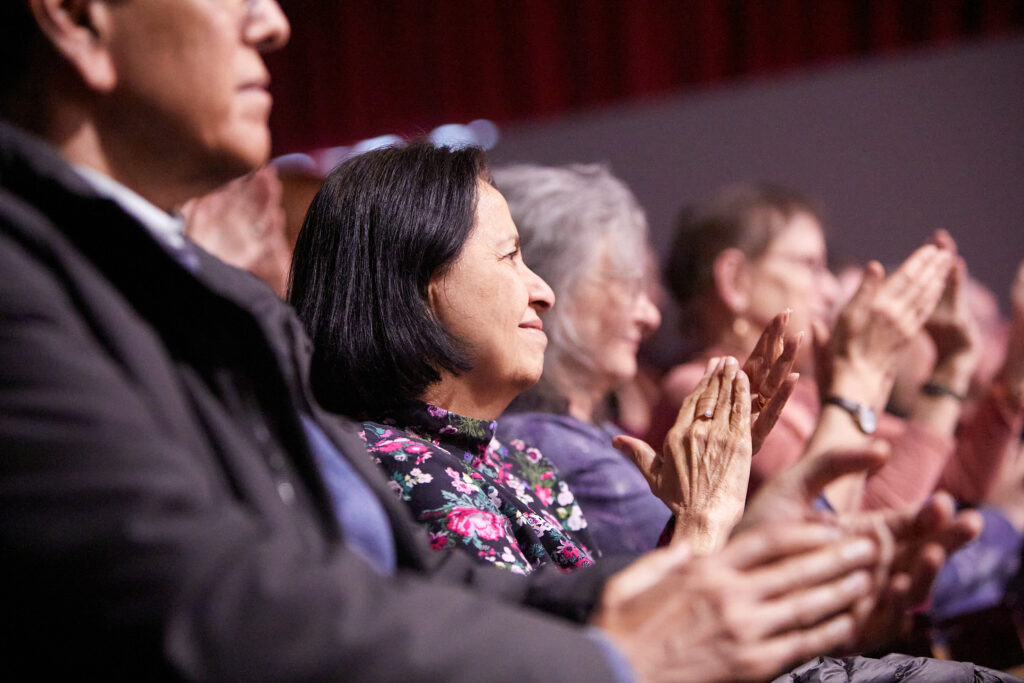
Thank you to Madeline for reviewing the first weekend at BLF 2024.
There’s still time to book tickets for events this weekend. If an event you would like to attend has sold out, you can add your name to the waiting list.
Book your tickets